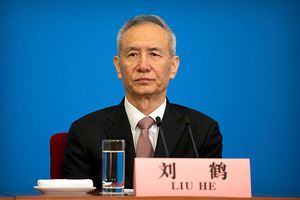A lot has recently been written about the canonization of “Xi Jinping Thought” and the abolishment of the term limit for the president in the Chinese Constitution. Relatively unnoticed however, at least in foreign policy circles, have been some other, equally bold decisions taken by the National People’s Congress (NPC) a few days ago, namely those in the realm of China’s economy and finance.
In policymaking, two things matter most: institutions and individuals. On both fronts, the 13th NPC has now blessed far-reaching changes, which have been cooked within the Party for some time and are likely to impact China’s economic and financial system, and hence the rest of the world, for years to come.
In terms of institutional reforms, as part of a gigantic government overhaul passed by the NPC, the banking regulator, CBRC, will be merged with the insurance regulator, CIRC, into the China Banking and Insurance Regulatory Commission (CBIRC – yet another acronym to learn). Rule-making and macro-prudential powers for the banking and insurance industry will move from the CBRC and CIRC respectively to the People’s Bank of China (PBoC). It is for this reason, and because the securities regulator, CSRC, remains untouched, that the PBoC is generally regarded as the winner of the big financial regulatory reshuffling.
Another strengthened State Council body – in China, ministries and institutions of ministerial rank like the PBoC are “departments constituting the State Council” 国务院组成部门 – is the National Audit Office (NAO), which will take over important powers — namely the auditing of key projects, fiscal oversight, and supervision of state-owned enterprises (SOEs) and their leaders — from China‘s much refocused planning agency, the National Development and Reform Commission (NDRC), the Ministry of Finance (MoF), and the State-owned Assets Supervision and Administration Commission (SASAC) respectively.
In terms of top officials, Hu Zejun and He Lifeng have been confirmed as auditor-general of the NAO and NDRC chairman respectively, Liu Kun has been appointed as minister of finance succeeding Lou Jiwei, and Yi Gang will succeed Zhou Xiaochuan as governor of the PBoC. The latter appointment is a surprise, as without key stints outside the PBoC, Yi Gang had widely been seen as not having sufficient political capital to lead the central bank.
But the biggest winner is probably Liu He, Xi Jinping’s most trusted economic aide. After being elevated to the Politburo last October, Liu now became vice premier in charge of economic and financial affairs as well as chair of the new State Council Financial Stability and Development Commission, established after the 19th Party Congress to oversee the PBoC and the three (and now two) regulatory commissions.
All these nominations and institutional reforms reflect Xi’s priorities of increasing Party control over the economic agenda and of getting financial risks under control, which for him are a matter of “national security.” Carl Minzner has argued that China is entering a “counter-reform era,” with a key set of governing norms developed during the 1980s and 1990s being unwound since Xi‘s rise to power five years ago. While this might partly be true for political norms, it is certainly not true for the economic and financial system, which has always been dominated by the Party via the state bureaucracy (so in that area it is also misleading to speak of a “take-over of the state by the Party,” as some have done) as well as directly via the Party’s Central Organization Department, which appoints the heads of all major state-owned banks and enterprises.
In Liu He’s view, both the economic and the financial system suffer from a reform gridlock that he wants to overcome to contain their large inherent risks and make the system as a whole more efficient. As the growth model of the past 40 years is no longer sustainable, with Xi’s support Liu wants to break state monopolies, develop the service sector, and foster the innovative spirit displayed by successful high tech and IT entrepreneurs.
Whether Liu will succeed remains to be seen, but his promotion and the fact that since then he has been quite outspoken about his reform plans suggests that he has the full backing of Xi Jinping.
An equally bold and not yet widely discussed decision has been the creation of the new State International Development Cooperation Agency as an organization directly under the State Council, which will take over the coordination of foreign aid from the Ministry of Commerce and the Ministry of Foreign Affairs. This is relevant as it ends the long-standing rivalry between the two for control of China’s foreign aid, and as it is closely linked with the Belt and Road Initiative, another top priority for Xi, which he pursues as a way to connect China with Asia, Africa, Europe, and beyond. While the head of the new agency is not yet known, it seems that it will be in charge of coordinating this massive infrastructure initiative, which from the Chinese perspective has political, economic, and financial motives, and the impact of which Europe and the rest of the world are already feeling almost every day.
Patrick Hess is a senior financial market and China expert with a long private and public sector experience and fluency in Mandarin. His publications and teaching experience, currently at Goethe University Frankfurt, focus on China’s economy, financial system and policymaking.

































